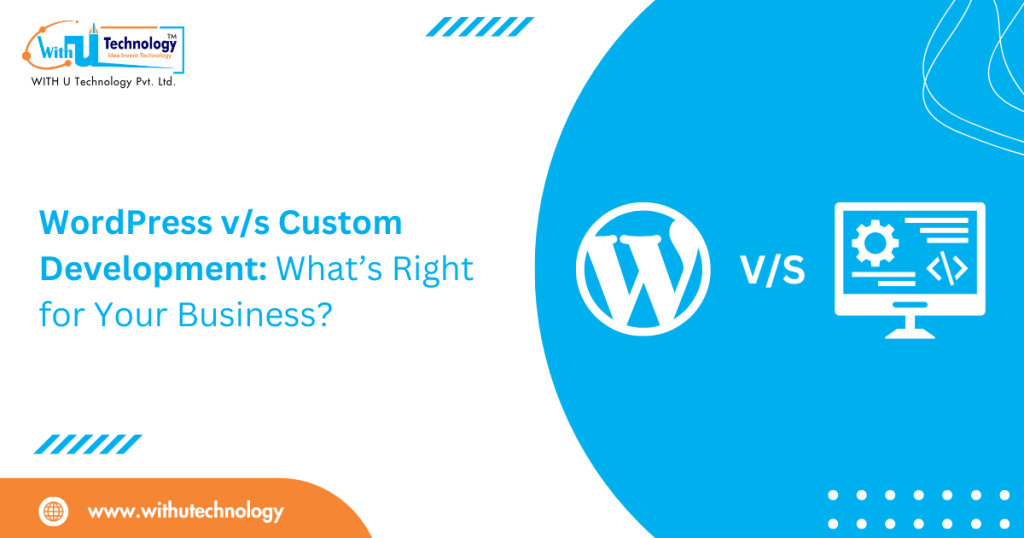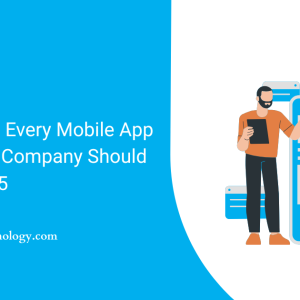When creating a professional website for your business, one of the key choices will be between WordPress and custom development. Both options have their own set of advantages and drawbacks; making a decision depends on factors like business goals, budget constraints and technical knowledge requirements as well as future scalability needs.
Since customers increasingly interact with businesses via the web, websites have become a crucial means of connecting. Therefore, choosing the appropriate platform from the start is crucial to creating the optimal customer experience and driving sales growth.
This blog post compares WordPress versus custom development from multiple perspectives: flexibility, cost, speed, scalability and security so that you can make an informed decision regarding which option best serves your business needs.
What is WordPress?
WordPress is a free, open-source content management system (CMS), used by over 43% of all websites worldwide. Although originally used as a blogging platform, WordPress has since evolved into an all-purpose solution capable of supporting websites of all sizes–from personal blogs to enterprise e-commerce portals.
WordPress makes website creation fast and effortless with access to thousands of themes and plugins for rapid website launch, even without advanced coding skills.
What is Custom Web Development?
Custom website development involves crafting a site tailored specifically to the needs of your business, using tools like HTML, CSS, JavaScript, PHP or Python programming languages or frameworks such as Laravel React, or Django for building each element from scratch.
This approach offers full control of your website’s features, design and functionality – ideal for businesses with specific requirements or complex workflows that off-the-shelf platforms can’t accommodate.
Key Comparison: WordPress vs. Custom Development
Let’s break down the major factors you should consider when deciding between the two options.
1. Cost
WordPress:
Lower initial development costs.
Most themes and plugins are either free or relatively inexpensive.
Can be managed with limited technical knowledge.
Ideal for startups and small businesses on a budget.
Custom Development:
Higher initial investment.
You pay for design, development, testing, and future enhancements.
Ongoing maintenance typically requires hiring a developer or agency.
Verdict:
If budget is a primary concern, WordPress is the more cost-effective option.
2. Development Time
WordPress:
Fast deployment; websites can be live within hours or days.
Pre-fill themes and plugins reduce development time significantly.
Ideal for businesses that need to go live quickly.
Custom Development:
Time-consuming; development can take weeks or even months.
Every element needs to be built, tested, and refined.
Better suited for long-term projects with unique features.
Verdict:
WordPress wins for speed and ease of launch.
3. Design and Flexibility
WordPress:
Offers thousands of themes, but customization can be limited without coding.
Heavy customization may lead to plugin conflicts or code bloat.
Developers can build custom themes, but that adds to the cost and time.
Custom Development:
Unlimited design possibilities.
Complete control over layout, animations, and interactions.
Tailored UX/UI optimized for your specific audience.
Verdict:
For full creative control and tailored user experiences, website development company in Jaipur is superior.
4. Functionality
WordPress:
Great for standard business websites, blogs, portfolios, and even small e-commerce stores.
Plugins offer extended functionality, but performance can suffer if overused.
Some advanced features may require complex workarounds or premium plugins.
Custom Development:
Built exactly to match business logic and processes.
No limitations on features or third-party integrations.
More efficient code and better performance for complex applications.
Verdict:
For unique business logic or complex apps, custom development provides unmatched functionality.
5. Scalability
WordPress:
Suitable for small to medium-sized websites.
Can scale with plugins and better hosting, but has limitations.
May require significant performance optimization for high-traffic sites.
Custom Development:
Built for long-term growth.
Easy to scale in terms of traffic, content, users, and functionality.
Modular development makes future upgrades easier.
Verdict:
If you plan to scale significantly, custom development is a better investment.
6. Security
WordPress:
Being widely used makes it a frequent target for hackers.
Security depends heavily on third-party plugins and updates.
Frequent need for monitoring and plugin updates to stay secure.
Custom Development:
Security features can be baked into the architecture.
Lower risk of attacks due to non-standardized code.
Tailored security protocols can be added as needed.
Verdict:
Custom-built websites offer better security, especially for sensitive data and enterprise use.
7. Maintenance and Support
WordPress:
Easy to manage with minimal technical skills.
Community forums and tons of documentation are available.
Plugin and theme updates are frequent and sometimes cause conflicts.
Custom Development:
Requires skilled developers for maintenance.
Less risk of unexpected issues if built properly.
It may be more expensive to update or fix bugs.
Verdict:
WordPress is easier to maintain for small teams; custom sites require ongoing technical support.
8. SEO Friendliness
WordPress:
SEO plugins like Yoast and RankMath make optimisation easy.
Clean URL structures and built-in blog functionality help ranking.
Can be affected by slow speed or bloated code from plugins.
Custom Development
SEO can be implemented at the code level for maximum efficiency.
Faster load times and custom SEO strategies can be embedded.
Requires technical SEO expertise.
Verdict:
Both can be SEO-friendly, but custom development offers more control for advanced SEO strategies.
When Should You Choose WordPress?
WordPress may be your ideal solution if you need an affordable and quick way of building websites.
Your business requires certain essential requirements (blog, portfolio and contact form).
Your team aspires to effortlessly manage content.
Are You Operating a Small Business, Freelancer Website or Start-up MVP?
When Should You Choose Custom Development?
Choose custom development if:
Your website requires unique functionality or complex workflows.
You’re launching a SaaS product, web app, or enterprise portal.
Security, scalability, and performance are high priorities.
You have a larger budget and a long-term digital strategy.
Hybrid Approach: Best of Both Worlds

Sometimes businesses take a hybrid approach–starting off with WordPress for speed and affordability before switching over to custom development as their needs expand. This enables:
Quick Market Entry and Audience Building.
Transition to Scalable Custom Architecture on a Gradual Basis
Final Thoughts
Decisions between WordPress and custom development ultimately boil down to your goals, budget, and long-term strategy. WordPress provides fast, budget-friendly web content management ideal for small businesses with content-heavy sites; custom development offers unrivalled control, performance, and scalability for enterprises with complex requirements.
Before making your choice, it is important to assess where your business is now versus where it needs to be in two to five years. Your website must not only meet current needs but also be flexible enough for future expansion.







